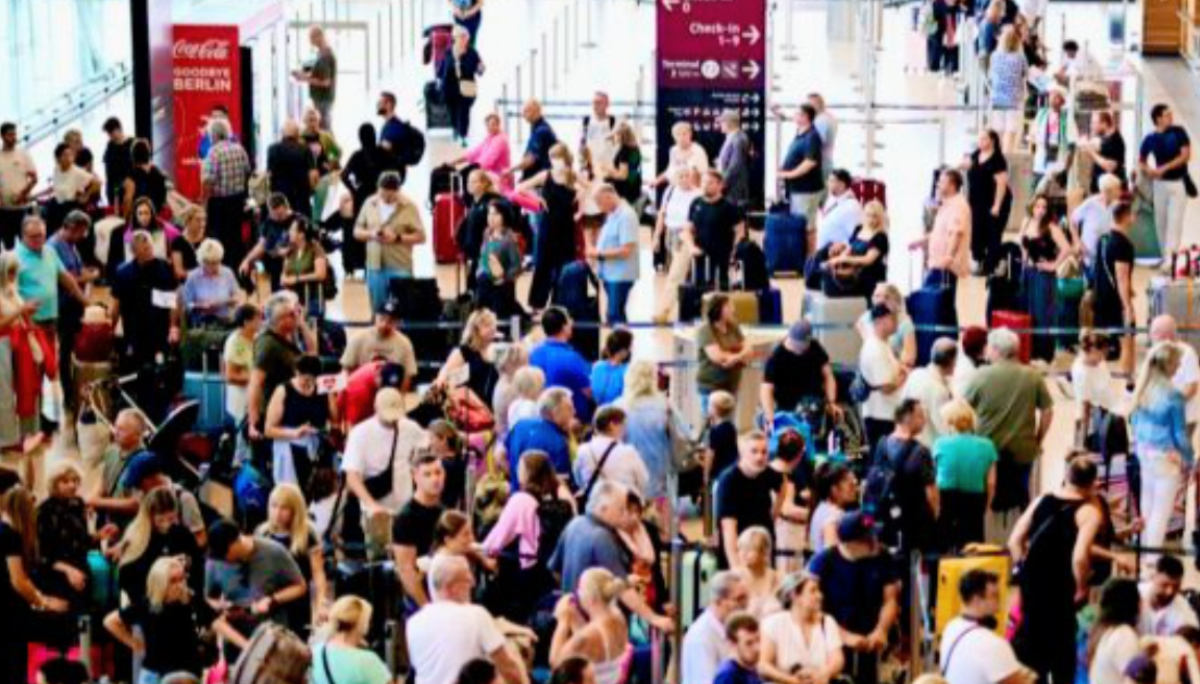Travelers at Hartsfield-Jackson Atlanta International Airport (ATL) on Sunday continued to navigate a chaotic weekend of delays and cancellations as the Federal Aviation Administration’s (FAA) enforces mandatory flight reductions due to severe air traffic control staffing shortages from the ongoing federal government shutdown.
Now in its 40th day, the shutdown has left thousands of essential workers, including FAA controllers, unpaid, prompting proactive cuts to ensure aviation safety.
Hartsfield-Jackson Leads Nation in Flight Cancellations
As of midday Sunday, more than 300 flights had been canceled at ATL, with hundreds more delayed by 30 minutes or longer, according to real-time data from FlightAware and Cirium aviation analytics.
On Sunday, Hartsfield-Jackson, the world’s busiest by passenger volume, led dozens of cancellations and delays that have stranded thousands.
The airport, the world’s busiest by passenger volume with over 2,500 daily flights under normal operations, is among 40 major U.S. hubs ordered to slash 4% of flights this weekend, a figure set to rise to 6% on Tuesday and 10% by Nov. 14 if the impasse persists.
Transportation Secretary Sean Duffy warned on CNN that air travel could dwindle to a “trickle” by Thanksgiving, potentially stranding millions.
The disruptions stem from the shutdown’s impact on 14,000 FAA air traffic controllers, many of whom are calling in sick or resigning due to financial strain.
At ATL, Delta Air Lines—its primary carrier—canceled around 170 flights on Saturday alone, while American and United followed suit with dozens more.
Regional operators like SkyWest and Envoy Air, which handle many feeder flights, reported cancellation rates exceeding 8% nationwide.
Local travelers shared frustration on social media. “Super frustrated—our Denver flight got diverted to Birmingham because of this mess,” tweeted one passenger waiting to pick up family at ATL. 5 Another user noted shorter security lines but “bunches of cancellations” dominating the departure boards, with international and hub-priority flights taking precedence.
Despite the chaos, airport officials reported TSA wait times under 15 minutes in most terminals, aided by lighter crowds from proactive cancellations.
Saturday saw even heavier impacts at ATL, with approximately 350 cancellations and 640 delays, exacerbated by an 81-minute ground stop for incoming flights.
Weather played a minor role—lingering thunderstorms cleared early Sunday—but freezing temperatures are forecast to dip into the upper 20s overnight, potentially complicating de-icing and early Monday operations in North Georgia.
Nationwide, the ripple effects are stark: Over 1,100 flights were canceled by Sunday afternoon, part of more than 4,000 disruptions since the cuts began Friday.
Airports like Chicago O’Hare and Newark Liberty saw the highest weekend totals, with ATL close behind. 20 Airlines for America estimates 4 million passengers affected since early October, urging Congress to act.
National Snapshot: Delays at the Busiest U.S. Airports
To contextualize ATL’s woes, below is a table summarizing reported flight delays (15+ minutes) at the nation’s five busiest airports by passenger traffic as of late Sunday, Nov. 9, 2025.
Data is aggregated from FlightAware and FAA reports, focusing on delays tied to the shutdown (staffing and reductions). Note: Figures are dynamic and updated hourly; cancellations are excluded here but contribute to overall delays.
| Airport | Code | Est. Daily Flights | Delays Today (Nov. 9) | Primary Cause |
|---|---|---|---|---|
| Hartsfield-Jackson Atlanta | ATL | 2,500 | 720 | FAA staffing reductions; ground stops |
| Dallas/Fort Worth International | DFW | 1,800 | 580 | 4% flight cuts; controller shortages |
| Denver International | DEN | 1,600 | 490 | Weather + reductions; 10% projected cuts |
| Chicago O’Hare International | ORD | 2,200 | 810 | Full ground stop; runway construction |
| Los Angeles International | LAX | 1,500 | 450 | High-volume cuts; minor weather delays |
Sources: FlightAware live tracker; FAA advisories. 27 34
What Travelers Should Do
- Check Status: Use airline apps or FlightAware for real-time updates. Avoid third-party bookings for easier rebooking.
- Rights: Under DOT rules, you’re entitled to refunds for significant delays/cancellations (3+ hours domestic). No compensation required for shutdown-related issues, but airlines must rebook promptly.
- Alternatives: Ground options like Greyhound/FlixBus report surging demand; book early. 33
- ATL Tips: Use the Plane Train for quick concourse hops; parking lots are less crowded but arrive 3+ hours early.
As negotiations stall in Washington, Peachtree City’s skies may see fewer jets this holiday season. Stay tuned to Atlanta Air Travel for updates—safe skies, Atlanta.





